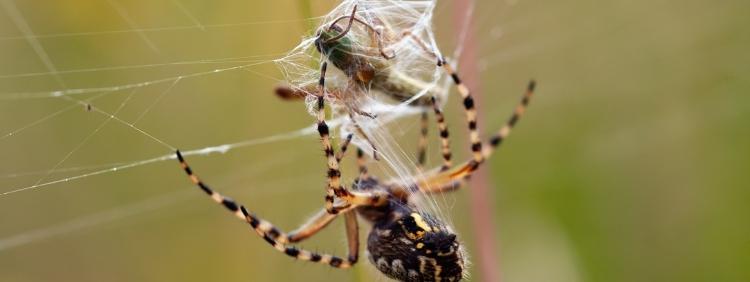The Difference Between Web and Hunting Spiders

Did you know that not all spiders build webs to catch their prey? Think of the hairy spider or two you may see skittering around your floor as the weather gets colder each year. In contrast, you may wonder why some spiders never seem to leave their webs — yet they remain happy and fed all year long. Are these spiders helpful home assistants that catch pests, or are they pests themselves? Learn more below about these two common categories of spiders and gain an understanding of when to call indoor spider control services if their numbers grow out of control in your home.
Two Different Types of Spiders
Some people — especially those who would rather not ever see a spider — couldn’t care less about whether a spider hunts, spins webs, jumps, or hangs out under the living room couch. They just want the spiders out! While this is an understandable response to seeing unwanted spiders in your home, you may feel better knowing that not all spiders are dangerous and very few residential spiders enjoy biting humans (though they will do so for self-defence if they feel threatened).
As a cautionary note, there are a few types of poisonous or dangerous spiders that you definitely want to avoid having in the home at all costs. We’ve listed the main differences between web-building spiders and hunting or “running” spiders below.
Web-Building Spiders
You’re likely familiar with the type of spider that builds intricate, spooky webs in the corners of your home and waits day and night for its prey. These spiders, as the name implies, spin webs to catch other bugs to eat. Some spiders like this can give you poisonous or painful bites, while others do not.
Most web-building spiders will not bite unless they feel threatened, but you’ll want to know what you’re dealing with before you leave a spider in your home. Orb spiders, black house spiders, and redback spiders are three common types of arachnids in this category.
Hunting Spiders
Spiders that do not build webs may be referred to as hunting spiders, ground spiders, or “running” spiders as they tend to charge across the floor when they’ve spotted prey. They run on the tips of their legs as they stalk and catch other bugs. Keeping one or two of these spiders around may actually cut down on other bugs in your home (such as mosquitos and ants). Wolf spiders, huntsman, and white-tail spiders are the most common hunting spiders you’ll find here in Canada.
Do Both Types of Spiders Invade Residential Homes?
A sudden appearance of several spiders may be a cause for concern, but is it an “invasion?” While it’s normal for web-building spiders to set up shop in the corner of your attic, hunting spiders often don’t come into your home on purpose unless it’s to escape cold weather.
A good bottom line to remember is that noticing one or two spiders is normal, but coming across 10 or 20 isn’t. If you notice this many of either type of spider, or if you spot a mother with lots of babies, or spiderlings, on her back, it’s time to call us for our four-season pest control service. Don’t attempt to eradicate this many spiders on your own, and take care not to disturb a nest if you think you’ve located it.
Contact Truly Nolen Today for Indoor Spider Control Solutions
Is it time to kick out your unwanted houseguests? Remember, one or two house spiders may be helpful to control the more annoying bugs in your home such as mosquitos, flies, and spiders, but you don’t want to play host to an entire nest of them. Contact Truly Nolen to learn more about our safe and effective indoor spider control services or schedule your inspection today.